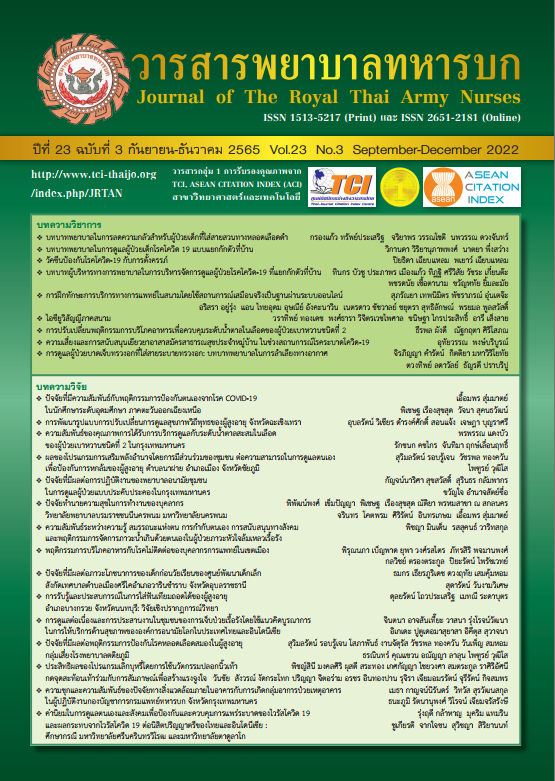Predictors of Helping Behavior on Smoking Cessation among Nursing Students
Keywords:
Smoking cessation helping behavior, Nursing students, Predicting factorsAbstract
This research is a descriptive study aimed to examine the smoking cessation helping behavior among nursing students and to explore factors predicting smoking cessation helping behavior of nursing students. The study was based on five factors of health literacy: accessibility skills, comprehension skills, questioning skills, decision-making skills, and application skills. The purposive sampling was 688 nursing students at nursing Institutes. The instruments were a questionnaire of heath literacy in smoking cessation helping and smoking cessation helping behavior. The Content Validity Index (CVI) was .92 and the Cronbach’s alpha coefficient were .92 and .96 respectively. The data were analyzed by mean, standard deviation, Pearson’s Product Moment Correlation Coefficient and Stepwise Multiple Regression Analysis.
The results revealed that the samples had 5 factors of health literacy were at a high level ( = 3.31, SD = .47). The smoking cessation helping behavior were at a moderate level (
= 2.87, SD = .64). The application skills (r=.50) and questioning skills (r=.45) predicted the smoking cessation helping behavior of nursing students by 27.4 percent (R2 = 0.27, F= 129.05). The recommendation develops a skills-building program that encourages knowledge of smoking cessation so that students have the attributes of being more literacy in smoking cessation.
Downloads
References
Perry, C. L., Creamer, M. R., Chaffee, B. W., Unger, J. B., Sutfin, E. L., Kong, G., Pentz, M. A. Research on youth and young adult tobacco use, 2013–2018, from the food and drug administration–national institutes of health tobacco centers of regulatory science. Nicotine and Tobacco Research, 2020.22(7), 1063-1076.
Jornburom Y., Chaiyasung P., Yakasem P., Sridet R. & Nanudorn A. Nurse’s role in enhancing adolescents’ perceptions of the dangers of electronic cigarettes. Thai Journal of Nursing. 2022; 70(1), 52-60. (in Thai)
Legal Center, Department of Disease Control. Tobacco Products Control Act, B.E. 2017. Bangkok: Printing House of Chulalongkorn University, 2017. (in Thai)
Pimroon S., Pungbangkadee R, Jewpattanakul Y. & Chuetaleng T. Factors Influencing Tobacco Control Practice among the Registered Nurses who Used to Attending as a Leader of the Nursing Student Smoke-free Thai Society Club. Journal of The Royal Thai Army Nurses 2021; 22(1), 216 -225. (in Thai)
Mahidol University Center for Research and Knowledge Management for Tobacco Control (SQI). Consumption Situation Report Tobacco of Thailand, 2019 (1st Edition). Bangkok: Sinthaweekit Printing, 2020. (in Thai)
Pungbangkadee R & Satsin T. Work Motivation in Tobacco Control: Nursing Student Club Creating a Smoke-Free Thai Society. Journal of Nursing and Health Care 2020; 38(3),14 -21. (in Thai)
Zhang L, Chen Y, Yang X. & Yin Q, Bai L. The perception and intervention of internship nursing students helping smokers to quit: A cross-sectional study in Chongqing, China. Int J Environ Res Public Health. 2019; 16(3), 1-13.
Raksatham S., Nirotnun U & Tirapaiwong Y. The Current Situation of Teaching for Health Promoting Smoking Prevention and Smoking Cessation of Nursing Students at Boromarajonani College of Nursing, Bangkok. Journal of Health and Nursing Research. 2019; 35(2), 71-82. (in Thai)
Chaiyasung P.,Tana P.,Sridet R & Wises N. The effificiency of potential development on knowledge and counselling skills on smoking cessation via online in educational institution among nursing student leaders. Thai Journal of Nursing. 2020; 69(1), 36-43. (in Thai)
Phongsakchat P., Areesophonpichet S. & Navicharern R. Health Literacy on Eating, Exercise, Emotion Health Behaviors Among Nursing Students. Dusit Thani College Journal 2020; 14(1), 226-240. (in Thai)
Ruamsook T, Tipwong A, Karuhadej P. Associations between health literacy and smoking cessation assistance behavior among village health volunteers, Amphawa District, Samut Songkhram Province. Journal of Public Health Nursing. 2019; 33,37-50. (In Thai)
Kaewdamkereng K. K-shape 5 skills to increase health literacy. Journal of The Health Education Professional Association. 2020; 35(2), 22-26. (In Thai).
Ruamsook T., Tipwong A., Vorasiha P., Wongsawang N & Lumrod N. Health literacy of knowledge and the understanding of tobacco and smoking behavior among older persons: A case study in Amphawa District, Samut Songkhram Province. Journa of Health Science Research, 2021; 15(1), 131-140. (in Thai)
Cohen, John M. and Uphoff, Norman T. Rural Participation: Concepts and Measures for Project Design, Implementation and Evaluation. In Rural Development Monograph No. 2 The Rural Development Committee Center for International Studies, Cornell University, January,1977.
Chinapong S. & Khaosanit P. Health Literacy, Health Behaviors, and Physical Activities of North Bangkok University Undergraduate Students. Journal of Health, Physical Education and Recreation. 2020; 46(2), 56-67.
Intarakamhang U. & Ekpanyaskul C. Effect of Positive Psychology and Cultural Social Norm on Healthy Behavior and Family Well-being by Mediated by Health Literacy of Family in the Sem i-Urban Community: Mixed Methods. Journal of Behavioral Science. 2018; 24(1), 1-22.
Nilnate W. & Rungchutiphopan W. Health Literacy and Nursing Professionals. Quality of Life and Law Journal. 2019; 15(2), 1-18.
Downloads
Published
How to Cite
Issue
Section
License
Copyright (c) 2023 Journal of The Royal Thai Army Nurses

This work is licensed under a Creative Commons Attribution-NonCommercial-NoDerivatives 4.0 International License.
บทความหรือข้อคิดเห็นใดใดที่ปรากฏในวารสารพยาบาลทหารบกเป็นวรรณกรรมของผู้เขียน ซึ่งบรรณาธิการหรือสมาคมพยาบาลทหารบก ไม่จำเป็นต้องเห็นด้วย
บทความที่ได้รับการตีพิมพ์เป็นลิขสิทธิ์ของวารสารพยาบาลทหารบก
The ideas and opinions expressed in the Journal of The Royal Thai Army Nurses are those of the authors and not necessarily those
of the editor or Royal Thai Army Nurses Association.






